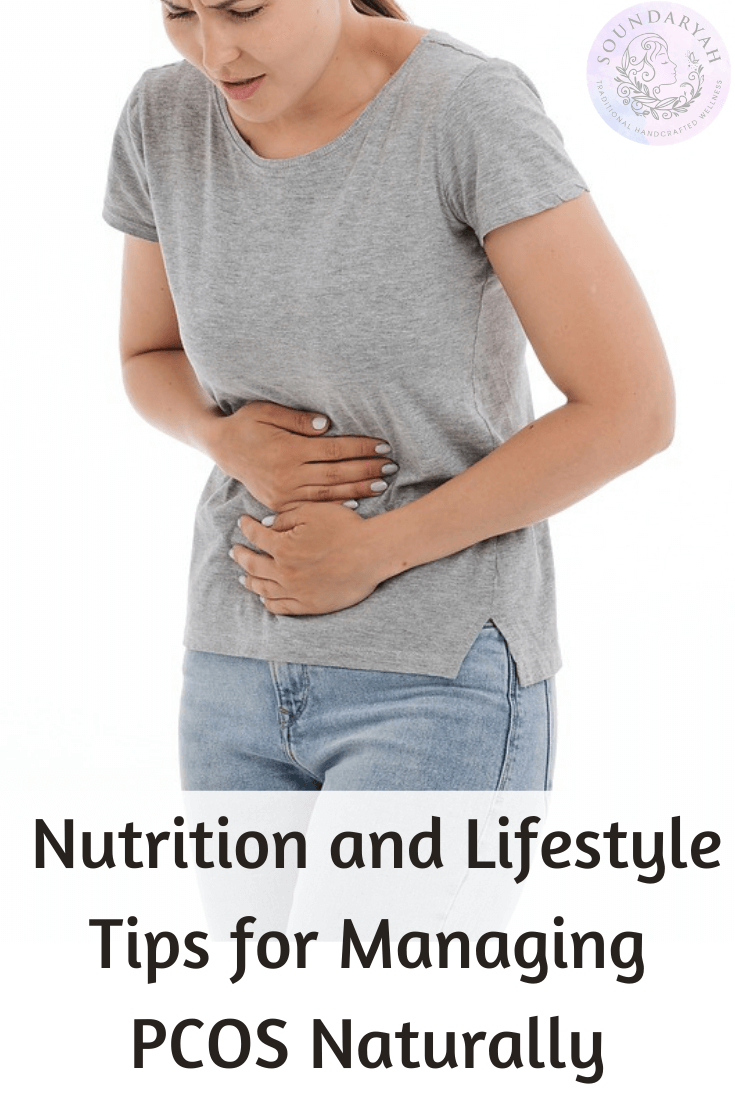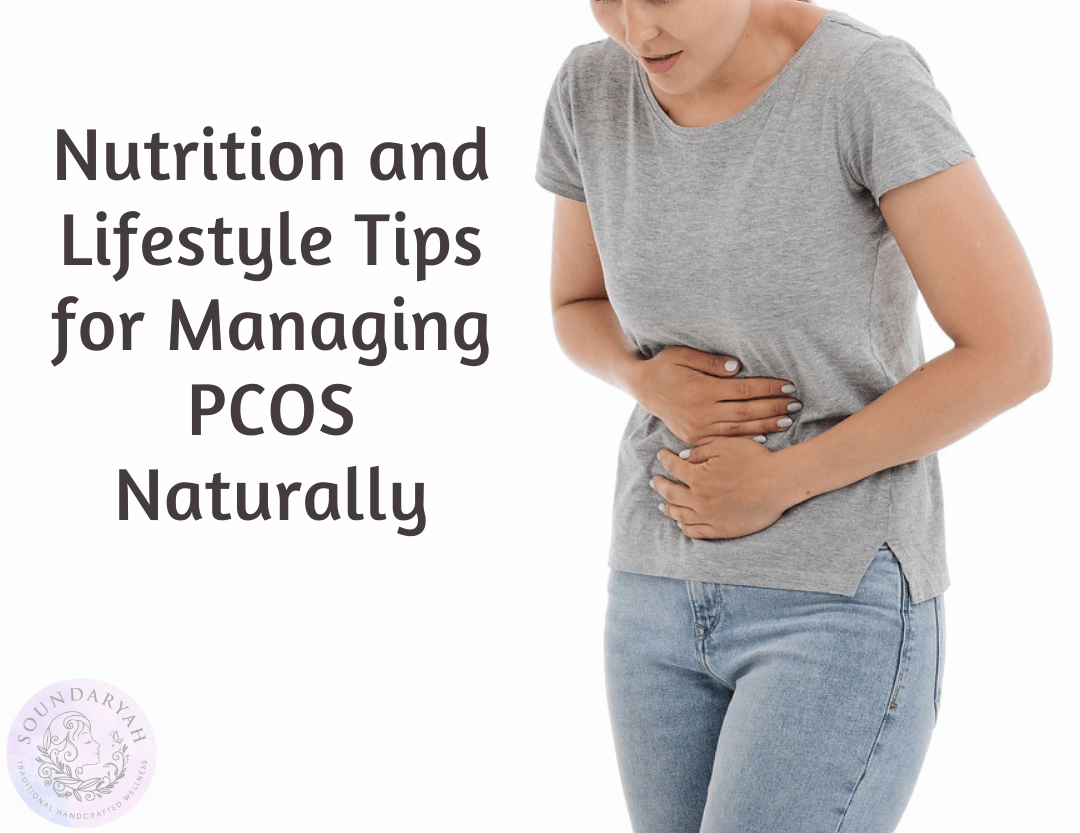PCOS is something that affects a large number of women across the world. Here are some Tips for Managing PCOS Naturally & effectively, without side effects.
We women often have many little niggling problems that we tend to ignore, as part of ‘the woman package’. Maybe it’s some extra hair on the face or difficulty in getting rid of those extra kilos. However, when they build up to problems like an inability to conceive or serious health conditions, that’s when we wonder if those little problems were part of the bigger picture. More often than not, that is exactly the case – those little issues were part of a big problem called PCOS.
What is PCOS?
PCOS is short for Poly Cystic Ovarian Syndrome, sometimes also referred to as Poly Cystic Ovarian Disorder, or PCOD. In PCOS, the ovaries are larger than usual and may have small cysts resembling strings of pearls. This disorder is usually due to an overproduction of androgens, or male hormones, compared to female hormones.
The illness occurs in women of child-bearing age. In India, it is estimated that about 1 in 5 women suffer from PCOS, with urban women being at greater risk. PCOS doesn’t have any definite diagnostic test. It is usually diagnosed after taking a medical history, particularly focusing on weight changes and menstrual cycles. In some cases, doctors may conduct a pelvic examination, an ultrasound or blood test. Common symptoms of PCOS include:
- Being overweight (about 50% women with PCOS are obese)
- Irregular menstrual periods
- Increased body and facial hair, especially on the upper lip, chin and back
- Loss of hair on the head
- Oily skin and acne
- Snoring and sleep difficulties
- Difficulty conceiving
The Trouble with PCOS

You are quite likely to have heard of someone or the other close to you having PCOS, considering how prevalent the illness is in India. Most of the concerns seem to be regarding infertility, but the issues with PCOS don’t stop there.
Over half the women who suffer from PCOS will have diabetes or pre-diabetes before turning 40. PCOS patients are also 4-7 times more likely to have a heart attack, and three times more likely to have endometrial cancer than women without PCOS. This disease also puts women at a higher risk for depression, anxiety and eating disorders. And as we already know, PCOS is the number one cause of female infertility.
With so much at stake, getting PCOS under control is crucial. But to do this, we first need to understand a little about how PCOS affects the body. The exact causes of PCOS is still unknown, but insulin resistance is a factor. Insulin resistance causes the body to pump higher levels of insulin to stabilize blood sugar. This increased insulin results in the production of more male hormones and we then get to see all the symptoms mentioned above.

Due to insulin resistance, PCOS often goes hand in hand with Type 2 diabetes and obesity, which further lead to health complications. Unfortunately, there is still no cure for PCOS, only management. Most medical management involves a combination of pills similar to birth control pills and hormone therapy. However, you may have to take other medications or supplements to treat specific symptoms.
The best way to deal with PCOS then, is by natural means. By making a few lifestyle changes, many women across the world have been able to reverse the effects of PCOS and get back their health. Just a 5% reduction in weight can have a significant impact on PCOS. Today we talk about 10 simple and doable nutrition and lifestyle tips for managing PCOS naturally and without side effects.
10 Nutrition and Lifestyle Tips for Managing PCOS Naturally

1. Avoid all Processed Foods

The first step in managing PCOS is by cutting out all processed foods from your diet. This includes all kinds of refined flour, refined sugar and other packaged foods. Refined carbohydrates like white bread and baked goods spike blood sugar levels and make insulin resistance worse.
Sugar is another simple carbohydrate that causes severe blood sugar spikes and crashes. Sugar is often hidden in a lot of packaged foods and may appear as sucrose, dextrose or high fructose corn syrup. Even fruit juices are full of sugar. Also be sure to cut out foods that cause inflammation, like deep fried foods, trans fats and processed meats.
Make healthy swaps like choosing whole grain or brown bread instead of plain white bread. Baked goods made from whole grain flour, millet or lentils are much better for blood sugar. Cook all your meals at home, and pack them if you are travelling. If you do have to eat from a packet, go for something with less than five ingredients that are recognisable and low in sugar and sodium content
2. Eat more Fiber

For women with PCOS, low carbohydrate diets are recommended, although completely cutting out carbs is not advised. Instead, it is more important to choose the right kind of carbohydrates, opting for those with a low glycemic index. Foods with a low GI are digested more slowly, preventing insulin spikes.
High fiber foods are the best kinds of foods for a low GI diet. These include whole grains, lentils, fruits, leafy greens, cruciferous vegetables, nuts and seeds. It is also advised to consume the most calories at breakfast, and gradually decreasing intake towards the end of the day.
3. Include Anti-Inflammatory Foods

PCOS is also described as general, chronic inflammation. Cutting down on processed food and eating more fiber will help with this condition, but adding anti-inflammatory foods to the diet will improve symptoms further. A plant-based diet along with fish is generally considered to be anti-inflammatory.
Fish is great for providing Omega-3 fatty acids which tackle inflammation. Other foods that help fight inflammation are tomatoes, leafy greens, berries, coconut oil, nuts and seeds. Most fruits and vegetables are also good in curing inflammatory symptoms.
Don’t forget the role of herbs and spices in fighting inflammation. Turmeric, which contains curcumin, is excellent both for reducing inflammation as well as stabilizing blood sugar levels. Other spices to include are black pepper, ginger, oregano, rosemary and thyme.
4. Increase Protein Intake

Cutting down on carbohydrates in the diet is likely to trigger cravings which could lead to overeating and more insulin spikes. Increasing protein intake takes care of this problem by keeping blood sugar levels under check and stabilizing insulin production.
Protein also helps improve symptoms of inflammation. Take care to choose healthy sources of protein like hormone free chicken, fish, tofu, eggs, beans and lentils. They are filling and prevent cravings and hunger. It’s best to combine a complex carbohydrate with protein at every meal, including snacks.
5. Fix Nutrient Deficiencies

PCOS patients are often plagued by nutrient deficiencies, along with other symptoms of PCOS and insulin resistance. There could be a number of reasons for this, including poor absorption and incorrect eating habits. It is important to ensure a proper intake of all the essential minerals and Vitamins that are important for overall health and in managing PCOS.
Women with PCOS are often found to be lacking in magnesium, a mineral that can improve insulin sensitivity. Magnesium can be found in almonds, cashew nuts and bananas. Another element that can help PCOS is zinc, which can also tackle hair growth or male pattern baldness. Zinc can be found in meat, nuts, beans and seafood.
Vitamin D and Calcium are other important nutrients that often end up deficient in PCOS, as well as chromium, a mineral that can regular blood sugar levels. In addition to this, if a woman with PCOS has been experiencing heavy bleeding, she may also be deficient in iron.
6. Cut down on Caffeine

Coffee may be what helps us function through the day, but it can also mess with our hormones. Having more than two cups of coffee a day can affect estrogen levels during certain phases of the menstrual cycle, which is already irregular in PCOS.
Besides, caffeine can trigger anxiety and increase stress hormones which in turn causes an insulin spike. Caffeine also disturbs the gut microbiome and disrupts sleep. If you really need a caffeine fix, opt for a gentler alternative like green tea, which also improves insulin resistance.
7. Make Time for Exercise

Controlling carbs, cutting out caffeine and processed foods and eating more whole foods is great for managing PCOS, but it’s not enough. Including at least 30 minutes of exercise five days a week does wonders in managing PCOS as well as losing weight and lowering the risk of Type 2 diabetes.
For PCOS, low to moderate impact exercise is recommended, like yoga, walking, swimming, Pilates or aerobics. Extremely intense exercise is not advised, since it can raise stress levels and backfire. Strength training is a great way to build muscle, lose weight and manage PCOS without risk of injury. Besides exercise, it is important to stay active throughout the day.
8. Manage Stress

Stress management is something we tend to associate with emotional wellbeing, whereas it’s just as important for physical health. Stress is connected to the hormone cortisol, and this can lead to weight gain, inflammation and other changes in the body like insulin spikes. Reducing stress helps regulate this hormone which brings everything else in the body back to balance.
Taking time out to relax everyday goes a long way in coping with stress. Even taking a walk in nature works. Yoga and meditation along with journaling also help deal with anxieties in a healthy manner. If none of these work, you can also try speaking to a professional who’ll provide you with the right tools to manage stress. You can also incorporate some herbs like tulsi or chamomile which are known to reduce cortisol levels.
9. Focus on Quality Sleep

One of the major factors that affects stress and cortisol levels is sleep. Lack of sleep can also affect our satiety hormones and trigger overeating the next day. Sleep can worsen PCOS symptoms, but on the other hand, women with PCOS have twice as much trouble sleeping as those without the condition. The only way out of this vicious cycle is to improve sleep hygiene and focus on quality, rather than quantity of sleep.
Go to bed at the same time every night, and you’ll naturally start waking up at the same time in the morning. Cut out caffeine several hours before bed. Eat a light dinner at least 2 hours prior to bedtime. Turn off screens and read something light before bed.
10. Stay Away from Endocrine Disruptors

We pay great attention to the food we eat, but we sometimes forget that we may be ingesting toxic chemicals in other forms. Many of the products we use in our daily lives may contain endocrine disruptors, which are chemicals that mess with the body’s natural hormone function. Many of these mimic estrogen, and this causes confusion in the body. For a person who is already suffering from PCOS, this hormone confusion can make things worse.
Endocrine disruptors are commonly found in skin and hair care products, under the names of parabens, phthalates, PEG, formaldehyde and fragrances. They’re also present in several household cleaning agents. Other endocrine disruptors can be found in single use plastics like plastic bottles or food containers. Stay away from these and opt for natural versions of all products. Read the ingredient list carefully to look out for these names.
Since PCOS has no cure and management consists mostly of treating specific symptoms, many women opt for nutrition and lifestyle changes, and these have been found to work better. However, it’s always recommended to speak to your doctor before making any change in your lifestyle, like starting a new exercise program or introducing a new food. It’s best to stay away from miracle drugs or fake claims. When in doubt, always ask the doctor first.

Did you find our “10 Nutrition and Lifestyle Tips for Managing PCOS Naturally” interesting, please let us know in the comments section.
For more interesting updates do follow us on Facebook and Instagram.


 Verified Purchase
Verified Purchase



![Youthful Glow Herbal Face Wash [100g] - Soundaryah](http://soundaryah.com/cdn/shop/products/1a_b5d64eda-7417-41b9-bad5-b271f4ef68ff_300x.jpg?v=1634899930)
![Royal Herbal Hair Wash [200g] - Soundaryah](http://soundaryah.com/cdn/shop/products/1_300x.jpg?v=1669120964)
![Intensive Body Polishing Ubtan [200g] - Soundaryah](http://soundaryah.com/cdn/shop/products/1a_8728dcb7-c696-447d-b42e-0a56a5326fb6_300x.jpg?v=1634899848)